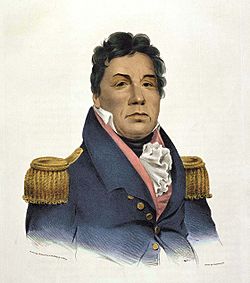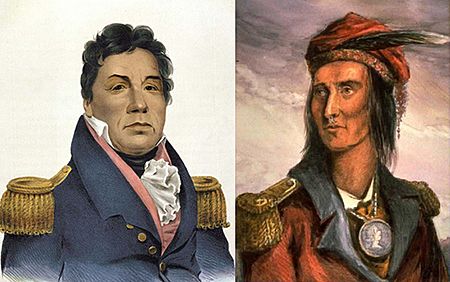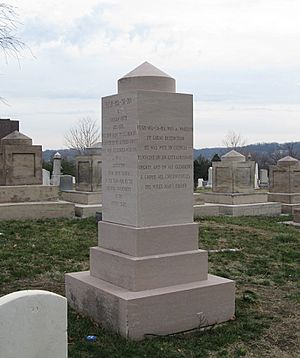Pushmataha facts for kids
Quick facts for kids
Pushmataha
|
|
|---|---|
| Apushamatahahubi (Choctaw) | |

Pushmataha, 1824, from History of the Indian Tribes of North America
|
|
| High Chief of the Choctaws | |
| In office 1815–1824 |
|
| Succeeded by | Chief Oklahoma (nephew) |
| Chief of the Six Towns District | |
| In office 1800–1824 |
|
| Succeeded by | Tappenahoma |
| Personal details | |
| Born | c. 1764 Taladega, Choctaw Nation |
| Died | December 24, 1824 (aged 59–60) Washington, D.C., U.S. |
| Resting place | Congressional Cemetery, Washington, D.C. |
| Children | 5 |
| Military career | |
| Allegiance | |
| Service/ |
|
| Rank | |
| Battles/wars | War of 1812 |
Pushmataha (born around 1764 – died December 24, 1824) was a very important leader of the Choctaw people in the 1800s. He was known as the "Indian General" because of his skills in war. Many people, including Native Americans and Americans, respected him for being smart and good at talking with others.
Pushmataha decided to help the United States during the War of 1812. He refused to join other tribes who wanted to fight against the U.S. He also worked on several agreements, called treaties, with the United States government.
In 1824, he traveled to Washington, D.C., to ask the government to stop taking more Choctaw land. While there, he met important people like John C. Calhoun and Marquis de Lafayette. A famous artist, Charles Bird King, painted his picture. Pushmataha died in Washington, D.C., and was buried with special honors.
Contents
What His Name Means
The exact meaning of Pushmataha's name is not fully known. However, many scholars believe it has something to do with "ending" or "finishing."
Some ideas for what his name might mean are:
- Apushamatahahubi: "a messenger of death" or someone whose weapons are always deadly.
- Apushim-alhtaha: "the young tree is ready for him."
- Pushmataha: "the warrior's seat is finished."
- Pushmataha: "He has won all the honors of his people."
- Apushimataha: "No more in the bag."
His Early Life
We don't know much about Pushmataha's childhood. His parents are not known, and some think they might have died in a fight with another tribe. Pushmataha himself never talked about his family history.
There is a legend about how he was born: A dark cloud appeared in the northern sky, bringing a strong wind. It covered the Choctaw land in darkness. Then, a fiery bolt struck a large oak tree, breaking it apart. From that spot, a warrior fully ready for battle appeared.
Most historians agree that he was born in a normal way around 1764, near what is now Macon, Mississippi, in Choctaw territory.
When he was about 13, Pushmataha fought in a war against the Creek people. Some stories say he was called "Eagle" as a young warrior. He also fought against the Osage and Caddo tribes between 1784 and 1789. By the early 1800s, he was known as a great warrior. These fights happened because the Choctaw's traditional hunting grounds were running out of deer. More people lived in the area, and tribes fought over animal furs to trade with Europeans. Pushmataha led raids into lands that are now Arkansas and Oklahoma. His knowledge of these lands later helped him when he talked about land with the U.S. government.
Becoming a Chief
By 1800, Pushmataha was seen as a strong military and spiritual leader. He was chosen as the mingo (chief) of the Okla Hannali, also known as the Six Towns district of the Choctaw. This area covered the southern part of their lands, mostly in Mississippi.
He was known for his clear thinking, good humor, and powerful way of speaking. He quickly became important in diplomacy. He first met with United States representatives at Fort Confederation in 1802. Pushmataha helped create the Treaty of Mount Dexter with the United States in 1805. He also met Thomas Jefferson, who was president at the time.
Role in the War of 1812
| "These white Americans ... give us fair exchange, their cloth, their guns, their tools, implements, and other things which the Choctaws need but do not make ... They doctored our sick; they clothed our suffering; they fed our hungry ... So in marked contrast with the experience of the Shawnees, it will be seen that the whites and Indians in this section are living on friendly and mutually beneficial terms." Pushmataha, 1811 – Sharing Choctaw History. Tecumseh, 1811 – The Portable North American Indian Reader. |
In 1811, another Native American leader named Tecumseh tried to get tribes to join together. He wanted to fight the United States to get back lands taken by settlers. Pushmataha, as chief of the Six Towns district, strongly disagreed with this plan. He pointed out that the Choctaw and their neighbors, the Chickasaw, had always lived peacefully with European Americans. He said they had learned useful skills and received fair trade.
The Choctaw and Chickasaw leaders voted against joining Tecumseh. Pushmataha even told Tecumseh that he would fight against anyone who fought the United States.
When the War of 1812 began, Pushmataha led the Choctaw to fight alongside the United States. He argued against the Creek tribe joining with Britain after a terrible event at Fort Mims. In 1813, Pushmataha offered to help the U.S. Army. He gathered 500 Choctaw warriors and was made a high-ranking officer in the United States Army.
Pushmataha and 150 Choctaw warriors fought in the Battle of Holy Ground on December 23, 1813. After this victory, more Choctaw warriors joined the fight. By early 1814, Pushmataha led a larger group of Choctaws with General Andrew Jackson to fight the Creek people near Pensacola. Many Choctaw warriors left after the final defeat of the Creek at Horseshoe Bend.
By the time of the Battle of New Orleans, only a few Choctaw warriors remained with the army. They were the only Native American tribe to fight in that battle. Pushmataha was known as a strict war leader. U.S. Army officers were impressed by his leadership and called him "The Indian General."
Becoming Principal Chief
After the wars, Pushmataha was chosen as the main chief of the Choctaw nation. He liked to keep Choctaw traditions, but he also agreed that his people should learn new technologies from the Americans. This included using cotton gins, new farming methods, and military training. He used much of his military pension (money he received for his service) to help fund schools for the Choctaw children. He also made sure his own five children received a good education.
Pushmataha negotiated two more land agreements with the United States. The first, in 1816, was for land that wasn't used much. But the Treaty of Doak's Stand, signed in 1820, was much harder. American settlers were moving onto important Choctaw lands. The government offered land in Arkansas and Oklahoma, but Pushmataha knew it was less fertile. He also knew that American settlers were already living there illegally.
Pushmataha was very skilled in these talks. He was even said to have a strong exchange with Andrew Jackson:
General Jackson said to the chief, "I want you to understand that I am Andrew Jackson, and, by the Eternal, you will sign that treaty as I have prepared it."
The powerful Choctaw Chief was not scared. He quickly stood up and, copying Jackson's manner, replied, "I know very well who you are, but I want you to understand that I am Pushmataha, head chief of the Choctaws; and, by the Eternal, I will not sign that treaty."
Pushmataha only signed the treaty after the U.S. government promised to remove the illegal settlers from the Choctaw lands.
Trip to Washington
In 1824, Pushmataha was still worried about settlers moving onto Choctaw land and local officials not respecting their land rights. He decided to go directly to the U.S. government in Washington, D.C. He led a group of other chiefs and leaders. They wanted the white settlers removed from their lands in Arkansas, or to be paid with land and money for those areas.
The group traveled a long way to Washington. Pushmataha met with President James Monroe and gave a speech to the Secretary of War John C. Calhoun. He reminded Calhoun of the long friendship between the United States and the Choctaw. He said, "I can say and tell the truth that no Choctaw ever fought against the United States... My nation has given away so much of their country until it is very small. We are in trouble."
While in Washington, Pushmataha had his portrait painted by Charles Bird King. He wore his Army uniform for the painting. This portrait became the most famous picture of Pushmataha. He also met with the Marquis de Lafayette, a French hero who helped America during the Revolutionary War. Pushmataha honored Lafayette as a fellow old warrior who had done great things for America.
His Death and Burial
In December 1824, Pushmataha became very sick with a breathing illness. Andrew Jackson visited him. On his deathbed, Pushmataha said that the nation's capital was a good place to die. His chosen helper also died suddenly on the way back to Choctaw lands.
Pushmataha asked for a full military funeral. He also gave clear instructions about his belongings. His last recorded words were:
I am about to die, but you will return to our country. As you go along the paths, you will see the flowers, and hear the birds sing; but Pushmataha will see and hear them no more. When you reach home they will ask you, 'Where is Pushmataha?' And you will say to them, 'He is no more.' They will hear your words as they do the fall of the great oak in the stillness of the midnight woods.
Pushmataha died on December 24, 1824. As he wished, he was buried with full military honors as a brigadier general of the U.S. Army. His grave is in the Congressional Cemetery in Washington, D.C. He is one of only two Native American chiefs buried there.
His tombstone says:
Push-ma-ta-ha, a Choctaw chief, lies here. This monument to his memory is erected by his brother chiefs who were associated with him in a delegation from their nation in the year 1824 to the general government of the United States.
Push-ma-ta-ha was a warrior of great distinction he was wise in council – eloquent in an extraordinary degree, and on all occasions & under all circumstances the white man's friend.
He died in Washington on the 24th of December 1824 of the croup in the 60th year of his age. Among his last words were the following "When I am gone let the big guns be fired over me."
Newspapers at the time reported on his death. The National Intelligencer said on December 28, 1824, that he was known for his strong speeches and his loyalty to the United States. It also mentioned that he fought with and for the settlers during the war. The Hampshire Gazette reported on January 5, 1825, that he was brave and skilled in war, having fought in 24 battles, some with General Jackson.
Who Came After Him
For about six months after Pushmataha's death, there isn't much record of who was chief of the Six Towns. However, Tappenahoma, who was Pushmataha's nephew, is later shown to have taken his place. A letter from June 1825 lists Tappenahoma in this role.
His Legacy and Honors
Pushmataha is still remembered and honored today:
- The Choctaw Nation in Oklahoma had a Pushmataha District where his tribe settled.
- The state of Oklahoma named Pushmataha County after him.
- The Boy Scouts of America named their local council, which includes the area of Nanih Waiya (a sacred Choctaw site), the "Pushmataha Area Council." Scouts learn about Pushmataha at their summer camp.
- Camp Pushmataha in Citronelle, Alabama, is named after him.
- The community of Pushmataha in Alabama is also named in his honor.
- Pushmataha Landing in Coahoma County, Mississippi is another place named for him.
- At least three ships have been named Pushmataha, including two U.S. Navy vessels.
His Family
Some historians have said Pushmataha was an orphan with no family. However, other people who knew him, like George Strother Gaines and Henry Sales Halbert, mentioned his family. Halbert wrote about a sister named Nahomtima, who was the mother of Tappenahoma. Gaines also mentioned the nephew who became chief after Pushmataha.
The agreement for the Treaty of Dancing Rabbit Creek mentions Pushmataha's widows. Only one widow is recorded as receiving land promised by the treaty. When she sold the land with her three children, her name was written in different ways, like Immahoka or Lunnabaka.
Some people today say they are descendants of Pushmataha. One writer, Charles Lanman, said Pushmataha had five children. These children were:
- Hashitubbiee, also known as Johnson Pushmataha, who died between 1862 and 1865.
- Betsy Moore.
- Martha Moore.
- James Madison, who disappeared after 1818.
- Running Deer, also known as "Julia Ann," born around 1780. She married Joseph “Jack” Anderson and had seven children before she died in 1810.
 | Tommie Smith |
 | Simone Manuel |
 | Shani Davis |
 | Simone Biles |
 | Alice Coachman |



